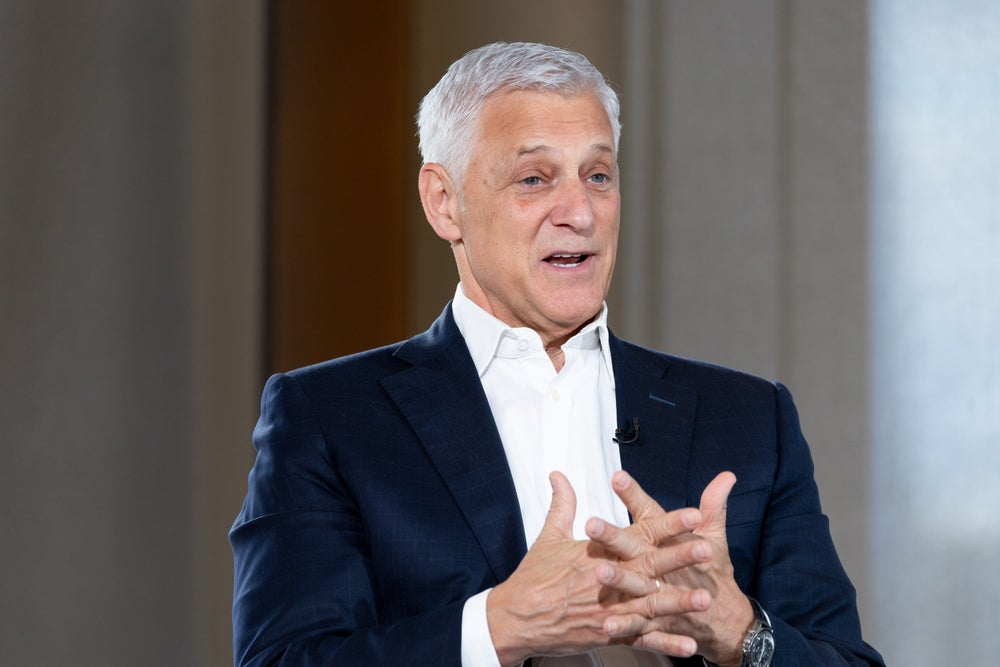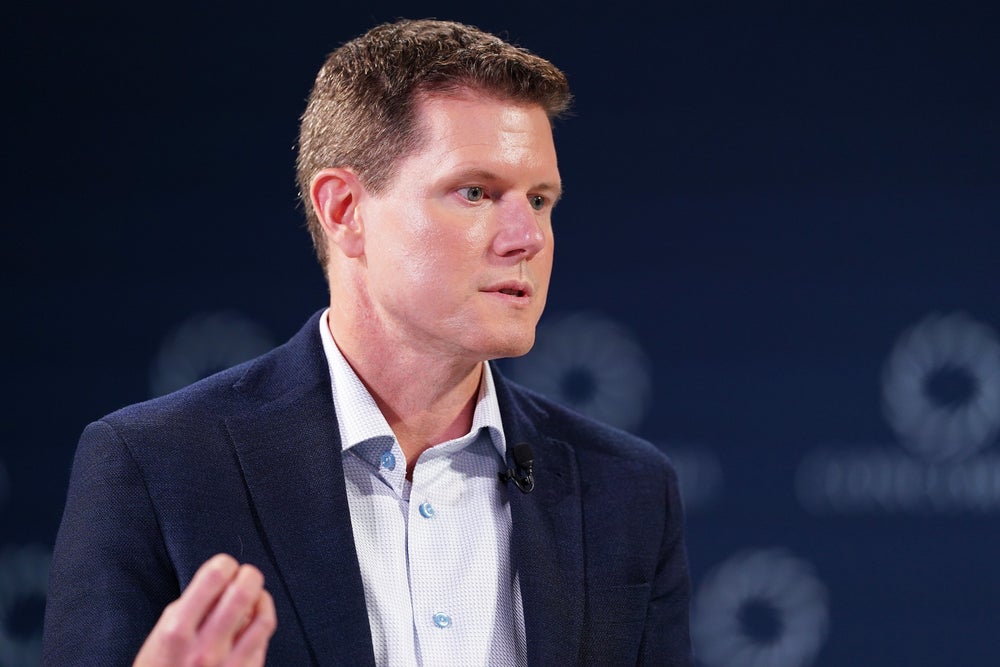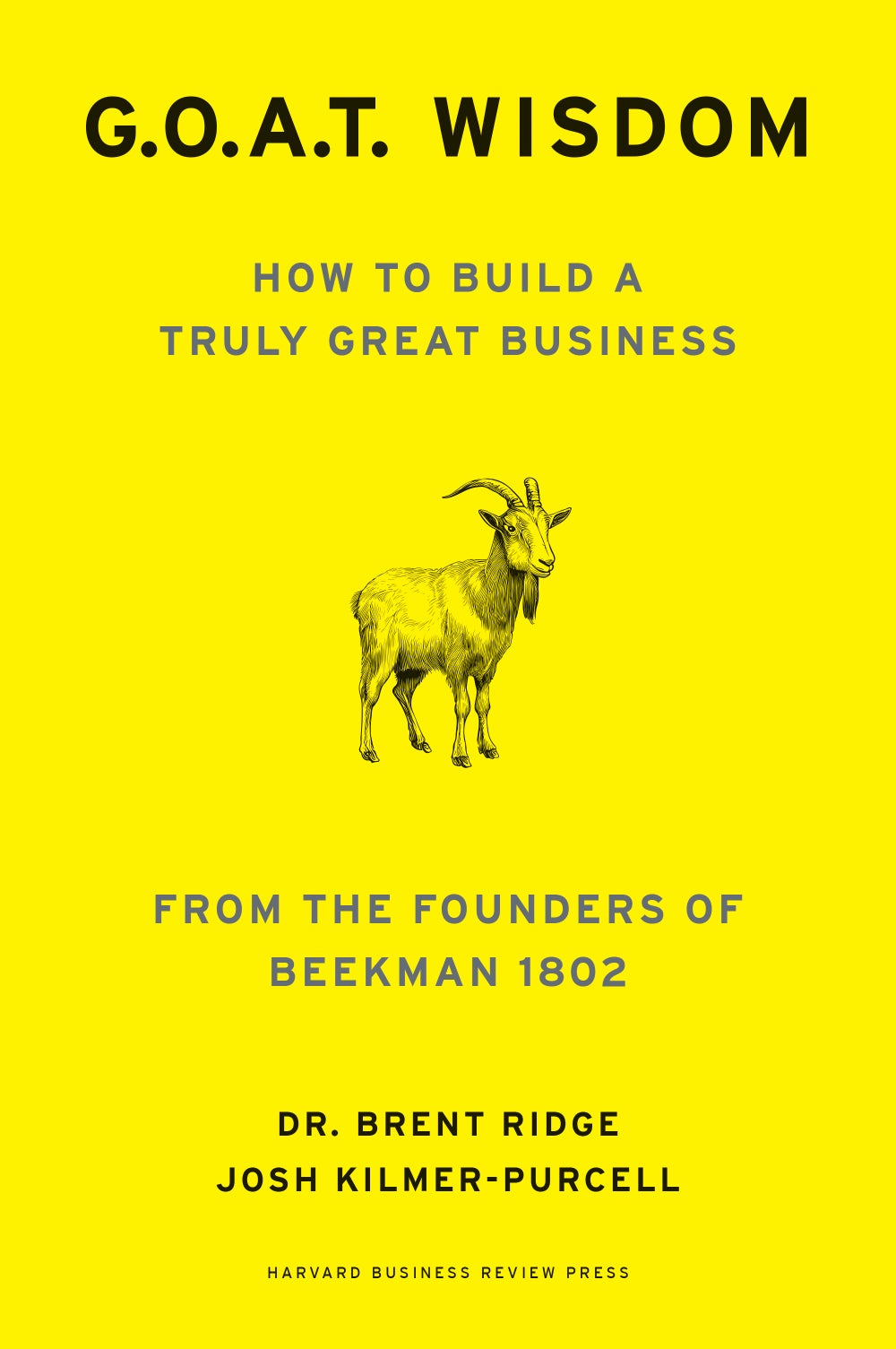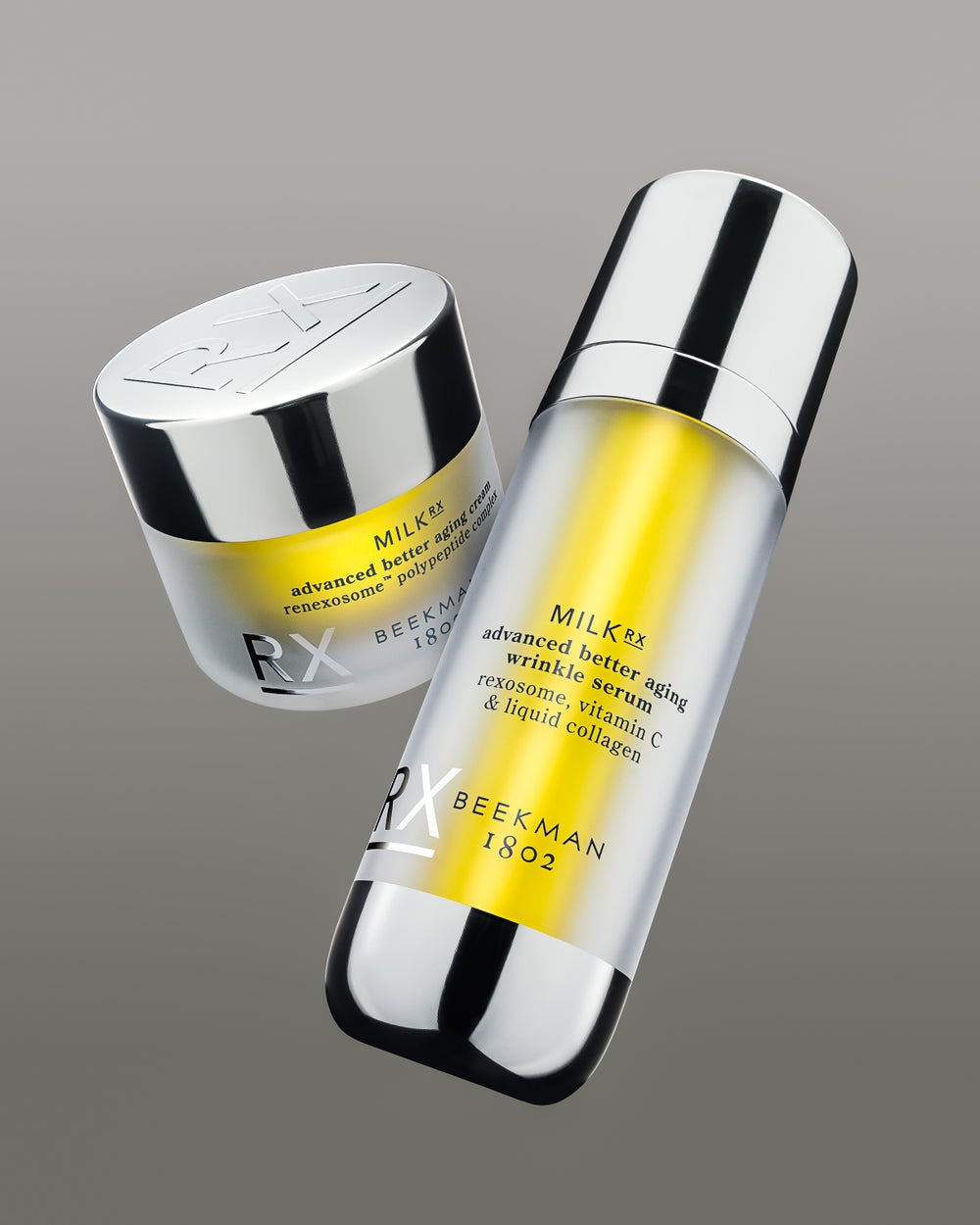In 2006, Josh Kilmer-Purcell and Brent Ridge didn’t have visions of becoming entrepreneurs with a goat milk skincare and body care brand. The New York City-based couple went on an apple-picking getaway upstate one weekend and stumbled on a little town called Sharon Springs. They fell in love with the town, and on their drive out, with a property for sale: Beekman Farm, its house built in 1802.
 Image Credit: Courtesy of Beekman 1802. Josh Kilmer-Purcell, left, and Brent Ridge, right.
Image Credit: Courtesy of Beekman 1802. Josh Kilmer-Purcell, left, and Brent Ridge, right.
Kilmer-Purcell and Ridge were far from professional farmers — Kilmer-Purcell worked in advertising, and Ridge was a physician who’d started the health and wellness division of Martha Stewart Omnimedia — but they thought the farm would be the perfect weekend place, so they cashed in their savings and purchased the property.
Not long after they moved in, they received a note from their neighbor, a farmer named John, who was losing his farm and had no place for his 80 goats. Would the couple mind moving the animals into the empty barn on their property? They agreed and invited John to live in a small cottage on the farm and be its caretaker.
Related: This Founder Noticed a Stark Change at a Local Pride Parade — and Says It Creates a ‘Real Opportunity’ for Small Businesses
“Everything was great,” the co-founders recall. Then the 2008 recession hit.
“We lost our jobs within 30 days of each other, and we had this new mortgage — we had to pay [off] the farm,” Kilmer-Purcell says. “So we literally Googled, ‘What can we make with goat milk?’ And the first thing that came up was goat milk soap.”
The co-founders note that while many entrepreneurs today start a business with the goal of eventually selling it, that was the furthest thing from their minds when they launched their brand in 2009 — they were “just trying to survive.”
“ I remember calculating that if we sold $80 worth of soap a day, that would be enough to pay the mortgage for that month,” Kilmer-Purcell says, “so some nights we’d be sitting there at like 10 p.m. in bed being like, ‘Come on, just one more order. Come in.'”
Now, Beekman 1802 has sold more than 60 million bars of that soap and surpassed $150 million in sales. Beekman 1802 sells its premium skincare and body care products via its website, QVC, Ulta Beauty, Amazon, Target, the LaGuardia Airport Kindness Shop, its flagship mercantile in Sharon Springs, independent retailers and more.
Related: The ‘Hustle’ He Started Out of His Station Wagon Became a Nationwide Business That’s About to Hit $300 Million: ‘Everything We Do Is Pretty Simple’
Kilmer-Purcell and Ridge have also published three cookbooks, and their first business book, G.O.A.T. Wisdom: How to Build a Truly Great Business, will be released on July 1.
 Image Credit: Courtesy of Harvard Business Review
Image Credit: Courtesy of Harvard Business Review
“We started selling the bars of soap on our website.”
One of the first steps was to build a website for the brand; back then, direct-to-consumer (DTC) sales were just starting to gain traction.
“ We were one of the very first beauty brands to be DTC,” Ridge says. “Josh learned how to code. He coded the first website, [and] we started selling the bars of soap on our website. But back then, of course, you were not going to make a fortune off of selling stuff on a website. It just wasn’t the environment.”
The co-founders wanted to take their all-natural, goat milk soap product where it had never been before — the luxury retail space. So Ridge cold-called luxury department stores on Fifth Avenue in New York City: Bergdorf Goodman, Barneys New York, Saks Fifth Avenue and Henri Bendel.
The buyer at Henri Bendel told Ridge that if he could commit to coming to the store every day for the next eight weeks ahead of the holiday season, the retailer would give them a three-foot by three-foot table on its main floor, where the brand could engage with the customers. If the product was a hit, then the store would stock its products going forward.
”So that’s what I did,” Ridge recalls. “I would get up every morning at the farm. It’s about a three-and-a-half-hour drive from the city. I would bring in all the soaps. I was set up on the little table. I would stay until closing at 8 or 9 p.m., drive all the way back three-and-a-half hours to the farm. I did it every day for eight weeks.”
Related: There Are Three Types of ‘No,’ Says the World’s Leading Door-to-Door Sales Expert. Here’s How to Know Which One You’re Hearing
As a physician and scientist, Ridge admits he didn’t know much about how to sell a product back then. However, through exposure to other salespeople on the floor and “osmosis,” he figured out how to do it effectively. Another major breakthrough came during that time: A buyer for Anthropologie stopped by on a scouting mission and “fell in love” with Beekman 1802’s story.
“That’s how we got our first big order,” Ridge recalls. “Our first big break was going national with Anthropologie.”
“[Reality TV] helped us grow a really loyal, manageable fan base quickly.”
For the first decade of the company’s growth, Beekman 1802 didn’t take any outside funding. The co-founders were committed to starting the business the “old-fashioned way,” not “spending $1 until they’d made $1.50,” in the wake of a recession where financial institutions had let so many people down.
As a result, the entrepreneurs didn’t have the money to market their brand in the early days. Well-aware of the value of media, Kilmer-Purcell and Ridge seized every opportunity to get Beekman 1802 in front of an audience, from local news programs to blogs.
Then the co-founders had the exciting and unexpected opportunity to star in their own reality TV show. Kilmer-Purcell was interviewing for a creative director position at a network when the president told him that she didn’t know if he was right for the job — but would he and Ridge consider appearing in a reality TV show about their life on the farm and launch of their business?
Related: What the C-Suite Needs to Know About the True Power of Earned Media
The co-founders embraced the opportunity to generate awareness for their brand, and within five months, The Fabulous Beekman Boys was airing.
“It helped us grow a really loyal, manageable fan base quickly,” Kilmer-Purcell explains. “But we weren’t distracted [by] becoming reality TV stars and trying to get another show and another show. It was just a really good free commercial that helped us start the business.”
The Fabulous Beekman Boys ran for two seasons, and although the co-founders weren’t seeking out more reality TV opportunities after it wrapped, another one came to them after a serendipitous encounter at one of their book signings: The chance to compete on CBS’s The Amazing Race.
“The Amazing Race story was so authentic to the brand that it was a multiplier.”
It was 2013, and Kilmer-Purcell and Ridge figured that even if they only made it halfway through the competition, the number of viewers tuning in would bring the Beekman brand significant exposure. In the first episode, they introduced themselves as “The Beekman Boys” to get the ball rolling and make sure “that was always what people would hear.”
“We were the underdogs the whole season,” Ridge recalls. “We were two middle-aged gay guys. We’re not going to beat the athletes and younger people. In the third or fourth leg, we were in Indonesia and thought we were going home. It was like 120 degrees; we had been struggling the whole day and were trying to finish up this task, carrying 100 pounds of bamboo and thought we were pulling up last. So we thought, You know what? Let’s just make the most of this.”
The couple happened to be walking down a street where a school was letting out; with a lot of kids around and curious about the camera crew, Ridge started chanting “Beekman Boys,” and the crowd joined in. “We just thought, Oh, what a great way to go out of The Amazing Race,” Ridge says.
Then the co-founders pulled off something they’d never expected: They won the entire race. Before the win, Beekman 1802 received about 100 orders per day on its website. Immediately after, that number surged to thousands.
“What was great about the fact that we were always in last place and called the ultimate underdogs the entire race [was that] it fit in with our founder’s story: having lost our jobs and starting on the farm, two gay New York City guys in a small town in rural New York and starting with nothing,” Kilmer-Purcell says. “The Amazing Race story was so authentic to the brand that it was a multiplier.”
 Image Credit: Courtesy of Beekman 1802
Image Credit: Courtesy of Beekman 1802
Related: How to Scale a Business Without Wasting Millions (Or Collapsing Under Your Own Growth)
Beekman 1802’s next big growth milestone came shortly after the co-founders’ success on The Amazing Race when the brand launched on TV retail. The entrepreneurs recognized the platform’s potential to tell Beekman 1802’s story and sell its products, but they knew they had to come up with a hook to halt viewers in their tracks.
So the couple opted to bring baby goats on air.
“It’s disruptive,” Ridge explains, “and makes you stop. If you get people’s attention, then you have a much higher likelihood of selling something. That was a real trick that we still use to this day. Now we’re the No. 1 skincare brand that crosses QVC and HSN.”
Beekman 1802 continued to scale, landing in Ulta Beauty, Target and Amazon. The brand’s Ulta rollout, set for approximately 1,500 stores, coincided with the pandemic and led the co-founders to seek their first outside investment for the company.
Eurazeo, a leading global investment group, acquired a controlling stake in the company with a $62 million investment in 2021.
“You have to go back to the fundamentals of what it takes to build a great brand.”
The co-founders have learned a lot growing their business over the years. Although they enjoy watching Shark Tank, the TV show where hopeful entrepreneurs can pitch their business ideas to the judges for potential investment, they warn aspiring founders not to fall for what they call “the Shark Tank effect” — the belief that they can’t start a business without raising money.
”What we found is businesses that start their life by raising money never actually become businesses,” Kilmer-Purcell says. “They just become fundraising businesses because they start by raising money and then a few months later, they raise more money, and then they have to raise more money — and they get better at raising money than running their own business.”
Seeing that pattern play out motivated the entrepreneurs to write G.O.A.T. Wisdom and share the lessons they’ve learned with the world.
“There are plenty of ways to have a good business where you can make money,” Ridge says, “but if you want a great business that’s going to have legacy and last, you have to go back to the fundamentals of what it takes to build a great brand.”
According to Ridge, ignoring trends is one key to success in the skincare and body care space, as copycat products will find it difficult to stand out in a market saturated with similar offerings.
“The world doesn’t need another vitamin C cream,” Ridge explains. “There are already a thousand vitamin C serums out there. What is the true innovation? How are you going to bring something new to customers that’s going to improve their lives?”
Related: Your Innovation Won’t Succeed Without Authentic Demand. Here’s How to Find It
The original act of kindness that came with the opportunity to host Farmer John and his goats remains Beekman 1802’s driving force, the co-founders say.
The company has donated hundreds of thousands of dollars in product and financial support to hundreds of worthy causes. The brand has also established a Kindness Krew: a community of skincare content creators and community influencers who are “passionate about spreading kindness to skin, animals, community and the planet.”
”Selling the product is the next level down,” Ridge says, “because we know that if we are successful in spreading kindness, then the product will have more value to [people].”
 Bill Winters. Photographer: Jason Alden/Bloomberg via Getty Images
Bill Winters. Photographer: Jason Alden/Bloomberg via Getty Images





 Jason Buechel. Photo by Leigh Vogel/Getty Images for Concordia Summit
Jason Buechel. Photo by Leigh Vogel/Getty Images for Concordia Summit
 Bumble CEO Whitney Wolfe Herd. Photographer: David Paul Morris/Bloomberg via Getty Images
Bumble CEO Whitney Wolfe Herd. Photographer: David Paul Morris/Bloomberg via Getty Images


 Image Credit: Courtesy of Beekman 1802. Josh Kilmer-Purcell, left, and Brent Ridge, right.
Image Credit: Courtesy of Beekman 1802. Josh Kilmer-Purcell, left, and Brent Ridge, right.  Image Credit: Courtesy of Harvard Business Review
Image Credit: Courtesy of Harvard Business Review Image Credit: Courtesy of Beekman 1802
Image Credit: Courtesy of Beekman 1802

 Nvidia co-founder and CEO Jensen Huang. Photo by Chesnot/Getty Images
Nvidia co-founder and CEO Jensen Huang. Photo by Chesnot/Getty Images